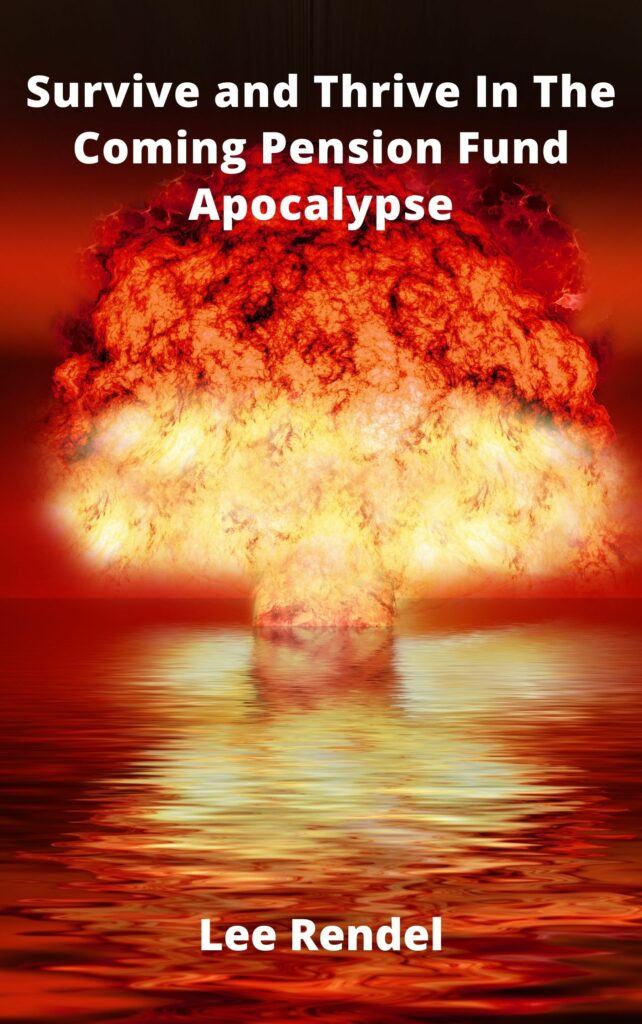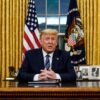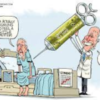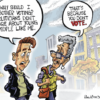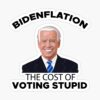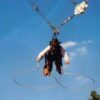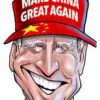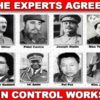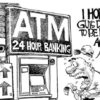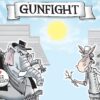Manhattan Prosecutors Will Begin Presenting Trump Case to Grand Jury
![]()
Manhattan Prosecutors Will Begin Presenting Trump Case to Grand Jury
in News

16.1k
SHARES
45.9k
VIEWS
Share on FacebookShare on Twitter
The Manhattan district attorney’s office on Monday will begin presenting evidence to a grand jury about Donald J. Trump’s role in paying hush money to a porn star during his 2016 presidential campaign, laying the groundwork for potential criminal charges against the former president in the coming months, according to people with knowledge of the matter.
The grand jury was recently impaneled, and witness testimony will soon begin, a clear signal that the district attorney, Alvin L. Bragg, is nearing a decision about whether to charge Mr. Trump.
javascript:window[“$iceContent”]
On Monday, one of the witnesses was seen with his lawyer entering the building in Lower Manhattan where the grand jury is sitting. The witness, David Pecker, is the former publisher of The National Enquirer, the tabloid that helped broker the deal with the porn star, Stormy Daniels.
As prosecutors prepare to reconstruct the events surrounding the payment for grand jurors, they have sought to interview several witnesses, including the tabloid’s former editor, Dylan Howard, and two employees at Mr. Trump’s company, the people said. Mr. Howard and the Trump Organization employees, Jeffrey McConney and Deborah Tarasoff, have not yet testified before the grand jury.
The prosecutors have also begun contacting officials from Mr. Trump’s 2016 campaign, one of the people said. And in a sign that they want to corroborate these witness accounts, the prosecutors recently subpoenaed phone records and other documents that might shed light on the episode.
A conviction is not a sure thing, in part because a case could hinge on showing that Mr. Trump and his company falsified records to hide the payout from voters days before the 2016 election, a low-level felony charge that would be based on a largely untested legal theory. The case would also rely on the testimony of Michael D. Cohen, Mr. Trump’s former fixer who made the payment and who himself pleaded guilty to federal charges related to the hush money in 2018.
Still, the developments compound Mr. Trump’s mounting legal woes as he faces an array of law enforcement investigations: A district attorney in Georgia could seek to indict him for his efforts to overturn his 2020 election loss in the state, and he faces a special counsel investigation into his removal of sensitive documents from the White House.
Mr. Bragg’s decision to impanel a grand jury focused on the hush money — supercharging the longest-running criminal investigation into Mr. Trump — represents a dramatic escalation of an inquiry that once appeared to have reached a dead end.
Under Mr. Bragg’s predecessor, Cyrus R. Vance Jr., the district attorney’s office had begun presenting evidence to an earlier grand jury about a case focused not just on the hush money but on Mr. Trump’s broader business practices, including whether he fraudulently inflated the value of his real estate to secure favorable loans and other financial benefits. Yet in the early weeks of his tenure last year, Mr. Bragg developed concerns about the strength of that case and decided to abandon the grand jury presentation, prompting the resignations of the two senior prosecutors leading the investigation.
One of them, Mark F. Pomerantz, was highly critical of Mr. Bragg’s decision and has written a book that is scheduled to be published next week, “People vs. Donald Trump,” detailing his account of the inquiry. Mr. Bragg’s office recently wrote to Mr. Pomerantz’ publisher, Simon & Schuster, expressing concern that the book might disclose grand jury information or interfere with the investigation.
For his part, Mr. Trump has denied all wrongdoing and chalked up the scrutiny — as he has many times before — to a partisan witch hunt against him. If he were ultimately convicted, Mr. Trump would face a maximum sentence of four years, though prison time would not be mandatory.
A spokeswoman for Mr. Bragg’s office declined to comment. Mr. Pecker’s lawyer, Elkan Abramowitz did not immediately respond to a request for comment. A lawyer for Mr. Trump, Ronald P. Fischetti, declined to comment, as did a lawyer for Mr. McConney and Ms. Tarasoff.
The panel hearing evidence about the hush money is likely what’s known as a special grand jury. Like regular grand juries, it is made up of 23 Manhattan residents chosen at random. But its members are sworn in to serve for six months to hear complex cases, rather than the routine 30-day panels that review evidence and vote on whether to bring charges in cases of burglary, assault, robbery, murder and other crimes.
The district attorney’s investigation, which has unfolded in fits and starts over the last four years, began with an examination of the hush money deal before expanding to include Mr. Trump’s property valuations. Last summer, Mr. Bragg’s prosecutors, working with the office of New York Attorney General Letitia James, returned to the hush money anew, seeking to jump-start the inquiry after the departures of Mr. Pomerantz and Carey R. Dunne, the other senior prosecutor in the investigation.
The district attorney’s office is also continuing to scrutinize the way that the former president valued his assets, the people with knowledge of the matter said.
Over the course of the lengthy inquiry into Mr. Trump and the conduct of his business, the hush money inquiry resurfaced within the district attorney’s office with such regularity in recent years that prosecutors came to refer to it as the “zombie theory” — an idea that just won’t die.
The first visible sign of progress for Mr. Bragg came this month when Mr. Cohen appeared at the district attorney’s office in Lower Manhattan to meet with prosecutors for the first time in more than a year. Now, he is expected to return for at least one additional interview with the prosecutors in February, one of the people said.
The lawyer who represented Ms. Daniels in the hush money deal, Keith Davidson, is also expected to meet with prosecutors in the coming weeks.
Mr. Trump’s company was instrumental in the deal, court records from Mr. Cohen’s federal case show.
Although Mr. McConney and Ms. Tarasoff were not central players, they helped arrange for the Trump Organization to reimburse Mr. Cohen for the $130,000 he paid Ms. Daniels, whose real name is Stephanie Clifford.
Allen H. Weisselberg, the company’s former chief financial officer, was also involved in reimbursing Mr. Cohen. And, according to Mr. Cohen, Mr. Weisselberg was involved in a discussion with Mr. Trump about whether to pay Ms. Daniels.
Mr. Weisselberg is currently serving time in the Rikers Island jail complex after pleading guilty to a tax fraud scheme unrelated to the hush money deal, a case that also led to the conviction of the Trump Organization in December. Although he was the star witness for the district attorney’s office in that case — testifying against the company that had employed him for decades — he has never implicated Mr. Trump in any wrongdoing.
Without his cooperation, prosecutors could struggle to link Mr. Trump directly to the misconduct.
In 2018, when Mr. Cohen pleaded guilty to federal campaign finance charges stemming from his role in the hush money payments, he pointed the finger at Mr. Trump, saying the payout was done “in coordination with, and at the direction of” the president. Federal prosecutors agreed that Mr. Trump wa
